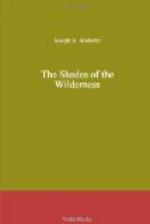From the smoky night encampment
Bore the banner of the rampant
Unicorn
And grummer, grummer,
Rolled the roll of the drummer,
Through the morn!”
The bugler played on. It was the same tune, curious, syncopated and piercing the night shrilly. Whole brigades of the South stood in silence to listen.
“What do you think is its meaning?” asked Lieutenant-Colonel St. Hilaire.
“It’s in answer to our song and at the same time a reproach,” replied Harry, who had jumped at once to the right conclusion. “The bugler intends to remind us that the old Continentals who stood so well were from both North and South, and perhaps he means, too, that we should stand together again instead of fighting each other.”
“Then let the North give up at once,” snapped Colonel Talbot.
“But in the trumpeter’s opinion that means we should be apart forever.”
“Then let him play on to ears that will not heed.”
But the bugler was riding away. The music came faintly, and then died in one last sighing note. It left Harry grave and troubled, and he began to ask himself new questions. If the South succeeded in forcing a separation, what then? But the talk of his comrades drove the thought from his mind. Colonel Talbot sent St. Clair, Langdon and a small party of horsemen forward to see what the close approach of the daring bugler meant. Harry went with them.
Scouts in the brushwood quickly told them that a troop of Union cavalry had appeared in a meadow some distance ahead of them, and that it was one of their number who had played the song on the bugle. Should they stalk the detachment and open fire? St. Clair, who was in command, shook his head.
“It would mean nothing now,” he said, and rode on with his men, knowing that the watchful Southern sharpshooters were on their flanks. It was night now, and a bright moon was coming out, enabling them to use their glasses with effect.
“There they are!” exclaimed Harry, pointing to the strip of forest on the far side of the opening, “and there is the bugler, too.”
He was studying the party intently. The brilliant moonlight, and the strength of his glasses made everything sharp and clear and his gaze concentrated upon the bugler. He knew that man, his powerful chest and shoulders, and the well-shaped head on its strong neck. Nor did he deny to himself that he had a feeling of gladness when he recognized him.
“It’s none other,” he said aloud.
“None other what?” asked St. Clair.
“Our warning bugler was Shepard, the Union spy. I can make him out clearly on his horse with his bugle in his hand. You’ll remember my telling you how I had that fight with him in the river.”
“And perhaps it would have been better for us all if you had finished him off then.”




